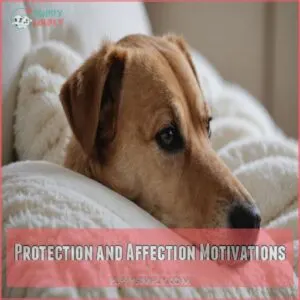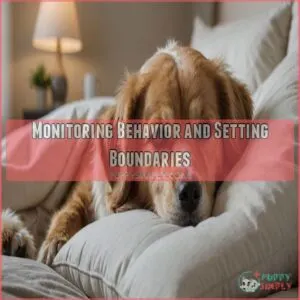This site is supported by our readers. We may earn a commission, at no cost to you, if you purchase through links.
 Ever wonder why your dog snoozes on your pillow? It’s like they’re saying, “I want to be close to you!”
Ever wonder why your dog snoozes on your pillow? It’s like they’re saying, “I want to be close to you!”
Dogs seek comfort, warmth, and your familiar scent. Imagine your pillow as a cozy security blanket that smells just like their favorite person—you.
This behavior also boosts their sense of security, affection, and loyalty. Your furry friend might even see it as their duty to watch over you while you sleep. Think of it as their version of home sweet home!
Curious about managing this cuddly habit or the potential health implications? We’ve got plenty of insights and tips ahead.
Table Of Contents
- Key Takeaways
- Why Dogs Prefer Pillows
- Protection and Affection Motivations
- Scent and Warmth Attraction
- Social Bonding and Imitation
- Health and Hygiene Considerations
- Managing Your Dog’s Sleep Habits
- Strengthening The Bond Through Shared Space
- Creating a Comfortable Sleeping Environment
- Frequently Asked Questions (FAQs)
- Why does my dog like to sleep on my Pillow?
- Why does my dog stay off my pillows?
- Do dogs need pillows?
- Why does my dog sleep snuggled up next to me?
- Should you let your dog snuggle up on a pillow?
- Why do dogs prefer pillows over beds?
- Does my dogs breed affect pillow preference?
- Is it okay if my dog snores on my pillow?
- How can I stop my dog shedding on my pillow?
- Will my dog get lonely without sleeping on my pillow?
- Should I worry about dog saliva on my pillow?
- Conclusion
Key Takeaways
- Your dog loves your pillow because it provides comfort, warmth, and your familiar scent, which makes them feel secure and connected to you.
- Sharing a pillow with your dog can deepen your bond, but it’s important to set boundaries and consider hygiene to maintain a healthy relationship.
- Dogs’ instinctive behaviors, like seeking proximity and warmth, drive them to choose your pillow over their bed.
- Providing a cozy dog bed infused with your scent and offering regular grooming can help address hygiene concerns and manage their pillow preference. You can also help keep your pup warm and comfortable with a heated bed, especially during colder months. Providing a cozy dog bed infused with your scent and offering regular grooming can help address hygiene concerns and manage their pillow preference.
Why Dogs Prefer Pillows
When your dog hops onto your pillow, they’re likely drawn to the familiar scent and cozy warmth, much like choosing a favorite blanket.
This behavior isn’t just about comfort; it’s a way for them to feel secure and connected to you, making your pillow an irresistible resting spot.
Seeking Comfort and Security
Sometimes, your dog just needs a little extra comfort and security at night, which might explain why it curls up on your pillow.
Your dog’s instincts as a pack animal drive it to seek closeness.
Remember these key points:
- Dog comfort is essential for their wellness.
- It reduces dog anxiety and stress.
- Snuggling habits can improve its nighttime routine.
Sense of Smell and Familiarity
Ever wonder why your dog loves your pillow?
It’s all about their amazing sense of smell.
Your scent weaves a comforting atmosphere that eases anxiety, wrapping your furry friend in a blanket of familiarity and security.
This connection to pleasant memories, as well as their instinct to sleep near their pack, makes your pillow their favorite spot for a cozy nap.
Your scent is their security!
Physical Comfort and Warmth
Imagine your dog snuggled on your pillow, basking in its cozy warmth. It’s all about physical comfort and warmth, enhancing their sleep experience.
Here are a few reasons they love your pillow:
- Body Heat: Dogs seek warmth, and pillows retain body heat efficiently.
- Soft Materials: Pillows offer comfort akin to dog beds.
- Comfort Seeking: Dogs naturally seek cozy spots.
Protection and Affection Motivations
Your dog’s choice to nap on your pillow might seem puzzling, but it often stems from their protective instincts and need for affection.
By snuggling up on your pillow, they’re creating a cozy watch-post, all while nurturing the bond they cherish with you.
Watching Over Their Owners
Guarding instincts drive your dog to nap on your pillow, keenly observing your surroundings.
Their protective nature assures you’re safe while you dream.
Dogs love their sleep patterns, and close proximity strengthens bonding behavior.
Think of them as pack animals bringing their watchful gaze to your bedroom.
| Behavior | Benefit |
|---|---|
| Protection | Owner safety |
| Observational Learning | Bonding behavior |
| Dominance Behavior | Instinctual behavior |
| Sleep Patterns | Intimacy and security |
Sense of Responsibility and Loyalty
That cozy pillow isn’t just comfy for you; it’s a strategic spot for your canine companion.
Your dog’s presence showcases loyalty in action, a protective instinct stemming from pack mentality.
They’re fulfilling their role in the family, vigilantly watching over their loved ones.
This sense of responsibility is a heartwarming indication of the deep bond you share, showcasing canine comfort and pet bonding at its finest.
It’s a beautiful display of guardianship instincts.
Strengthening The Bond
Strengthening the bond with your furry friend is more than just pillow cuddles; it’s about building an emotional connection through shared activities and consistent routines.
Dogs often seek closeness as a sign of attachment, sometimes risking over-attachment.
Engage in playtime and training to reinforce positive habits, creating a harmonious balance in your human-dog bond while addressing potential behavioral issues.
Scent and Warmth Attraction
Your dog snuggles up on your pillow because it smells like you, which, for them, is like a warm hug.
The pillow retains your body heat, making it the perfect cozy spot, especially when it feels like winter in Antarctica!
Familiar Scents and Associations
Does your dog’s fondness for your pillow puzzle you?
It’s not just seeking comfort; it’s about the magnetic pull of familiar scents.
Your scent weaves a tapestry of memories and safety for your dog, like a soundtrack of comforting tunes.
This behavior taps into their pack instincts, where your scent serves as a soothing reminder of their loyal connection.
Retained Body Heat and Warmth
You’ve already noticed how your scent comforts your pup, but warmth plays a big role too.
Dogs adore warm spots and your pillow offers not just your scent but retained body heat.
It becomes a cozy nook, a seasonal favorite during chilly months.
Your pillow warmth versus body warmth debate might seem silly, but for your dog, it’s all about comfort!
Social Bonding and Imitation
Your dog may snooze on your pillow because they want to bond with you and mimic your behavior, just like a mini shadow.
As they curl up where you do, it’s their way of expressing affection and showing loyalty, making them your fluffy partner in crime even during nap time, and this is a way of expressing affection.
Forming Strong Bonds With Owners
As your dog snuggles into your pillow, it’s building strong bonds with you through shared intimacy and trust.
This behavior reflects their social nature and emotional needs, similar to enjoying your scent.
Consider these aspects:
- Owner influence: Your presence offers comfort.
- Pack dynamics: Dogs thrive on connection.
- Trust building: This pillow-sharing act seals the deal.
Mimicking Owner Behavior
That strong bond you share? It’s why your dog might mirror your actions.
They’re learning from you, constantly observing your routines. Think of it as an adorable imitation game!
This copycat behavior, called social mirroring, isn’t just cute; it’s a sign of a deep connection.
So, that pillow-sharing? It’s your pup’s way of saying, "I love you, and I want to be just like you!" It’s a reflection of your dog’s love and trust.
Expressing Affection and Loyalty
Spotting you grabbing a pillow first sets the stage for the ultimate show of affection.
Your dog’s need to snuggle close is pure Dog Cuddle Time—and their way of saying "you’re my favorite human."
This loyalty speaks volumes of Owner Dog Bonding and Canine Affection, forming a pack-like connection rooted deeply in dog breeds and the wonders of pet psychology, as seen in the way dogs can learn to associate kisses with affection through positive experiences.
Health and Hygiene Considerations
You might love snuggling with your dog, but sharing a pillow can raise health and hygiene concerns.
From allergies to shedding fur, these issues can be a problem.
Regular vet check-ups and keeping bedding clean can guarantee a cozy, worry-free environment for you both, with a worry-free atmosphere.
Potential Health Risks and Concerns
Reconsider your dog’s pillow-hogging habits, as health concerns could lurk beneath cozy cuddles.
Their fur often harbors pet dander, dust mites, and potentially pesky fleas or ticks.
Allergies might flare up, or bacteria could spread. While these risks aren’t extreme, they’re worth considering for everyone’s well-being.
It’s a tangled issue of love and health implications, balancing comfort and caution.
Maintaining Hygiene and Cleanliness
After tackling potential health risks, keeping things squeaky clean around Fido’s favorite spot is key.
Designate a pet grooming area with brushes, combs, nail clippers, and pet-specific shampoos from your pet care station to keep fur and dander in check.
Try these tips for a tidy and healthy pillow-sharing experience:
- Dog grooming tips to keep fur and dander in check
- Allergen reduction methods for a sneeze-free zone
- Pet-safe laundry practices
- Regular vacuuming habits
- Use scent-free cleaning products for added freshness
Consultation With Veterinarians
A vet visit‘s a smart move, especially if you’re worried about health risks.
Before using essential oils near your furry friend, always check with your vet.
They can help you navigate potential allergies and age-related factors.
Here’s a quick guide:
| Issue | Vet’s Role | Next Steps |
|---|---|---|
| Skin allergies | Diagnose, recommend treatment | Adjust dog grooming, pillow hygiene |
| Health conditions | Identify underlying medical issues | Follow vet’s treatment plan |
| Behavioral changes | Rule out medical causes for behavior shift | Consider training, address underlying issues |
Managing Your Dog’s Sleep Habits
If your dog has taken a liking to your pillow, you might feel like you’re sharing your bed more than you’d like.
Learning to manage your dog’s sleep habits can help you establish boundaries and find alternative sleeping options for your furry friend.
Discouraging Pillow Sleeping
When your pup snuggles up on your pillow, it might feel cute but can disrupt sleep habits.
Encourage independence by setting firm boundaries and creating a bedtime routine.
Here’s the lowdown:
- Consistency is key: Maintain the same routine nightly.
- Introduce rules: Restrict pillow access with gentle, positive reinforcement.
- Mind the scent: Use your scent to calm them elsewhere.
Providing Alternative Sleeping Options
To keep your dog off your pillow, offer a cozy alternative.
Consider using calming beds for anxious dogs, such as donut beds with high edges, to provide a sense of security and comfort.
Consider the dog’s size, such as a Cavapoo’s typical weight range of 9 to 25 pounds, when determining their ideal bed size for Cavapoo. Choose a dog bed that matches their sleep style and size, ensuring comfort.
Location matters! Place it near your bed to ease any anxiety.
Infuse the bed with your scent by adding an old shirt.
This way, your pup feels comforted, and everyone can enjoy a good night’s sleep.
Establishing Boundaries and Training
While offering your pup a cozy dog bed, consider adding a soft dog blanket is a great start, blankest for your dog to make it even more inviting.
Don’t forget the power of training techniques.
Set clear boundaries and use positive reinforcement to guide their behavior.
Consistency is key in this gradual adjustment.
Crate training can help if approached with patience, ensuring your furry friend respects your pillow space without missing out on affection.
Strengthening The Bond Through Shared Space
When your dog curls up on your pillow, they’re not just after comfort; they’re deepening the connection between you two.
This shared space helps create a cozy sense of belonging, like two friends snuggling for movie night.
Creating a Sense of Belonging
You might notice your dog snuggling on your pillow, and it’s more than just comfort.
This behavior strengthens the emotional connection, creating a shared space that feels like a safe haven, and can be further encouraged with the right Dog Pillow Accessories.
Pack behavior influences this, as dogs thrive on closeness.
It’s their way of saying, “We’re in this together,” forming a secure bond that echoes a loving dog-owner relationship.
Encouraging Independent Sleeping Habits
A comfy dog bed, strategically placed near your bed, is key. Just like how dogs sleep under beds due to their den instincts and security, a cozy den near your bed can also foster a sense of safety and comfort.
Gradually move your furry friend by using positive reinforcement. Reward their efforts with treats and praise.
- A cozy den fosters independence.
- Consistency is important for a regular sleep routine.
- Patience is key; it’s a marathon, not a sprint!
Monitoring Behavior and Setting Boundaries
Setting clear boundaries helps your furry friend understand where they should sleep.
Keep dog bed placement consistent and stick to a sleep schedule.
Remember, consistency is key.
Positive reinforcement and training techniques can guide them gently.
Think of dog training consulting as guidance, not rules—like teaching a kid bedtime habits.
Monitoring their behavior prevents dominance issues, fostering harmonious cohabitation.
Creating a Comfortable Sleeping Environment
Making your dog’s bed a cozy oasis can help keep them off your pillow and sleeping soundly.
You can add familiar scents, like an old t-shirt, and reward their good sleeping habits with praise or treats.
Providing a Suitable Dog Bed
Imagine your pup dozing in a dog bed perfect in size and made from soft, durable materials.
Position it where your dog feels safe; perhaps near your bed.
Include comfy features like plush padding.
Don’t forget: regular bed maintenance and dog grooming are essential.
Reward them for using their bed, and soon, they’ll be snoozing peacefully.
Adding Familiar Scents and Textures
Dogs frequently love your pillow’s cozy familiarity.
Enhance this by adding familiar scents and textures to their bed.
Use an unwashed pillowcase or a shirt as comforting layers.
Consider textures like soft fleece, such as those found in a dog bed fleece blanket.
This simple DIY solution taps into their scent preferences and reinforces classical conditioning.
Offering these alternatives mimics ethology and supports their psychological comfort, promoting better sleep habits.
Rewarding Good Sleeping Habits
While adding familiar scents can help, don’t overlook the power of rewarding good sleeping habits.
Establishing a consistent bedtime routine, like a calming walk before bed to ensure they’ve had a final bathroom break to help corgis sleep through the night, can make all the difference. Positive reinforcement and patience can transform your pup’s sleep routine.
Here’s how:
- Praise your dog when they nap in their bed.
- Offer dog treats for consistent behavior.
- Utilize clicker training for clarity.
- Seek professional guidance if needed.
Frequently Asked Questions (FAQs)
Why does my dog like to sleep on my Pillow?
Who knew pillows had special powers?
Your pup snoozes on yours for comfort and your scent; it’s like his version of a favorite blanket.
Plus, being close lets him watch over you and strengthen your bond.
Why does my dog stay off my pillows?
Your dog might stay off your pillow because it’s found a comfy spot elsewhere or you’ve set clear boundaries.
Maybe your pillow doesn’t smell appealing, or your dog simply prefers its bed.
Dogs have quirks, like us!
Do dogs need pillows?
Dogs don’t need pillows like humans, but many enjoy them for comfort and warmth.
Pillows can create a cozy resting spot, resembling the security of a pack.
Just make sure it’s washable and dog-friendly for a snooze.
Why does my dog sleep snuggled up next to me?
Snuggling close, your dog seeks warmth, comfort, and the reassurance of your presence.
It’s like they’re saying, "You’re my safe place."
This behavior strengthens your bond, offering them security while also showing their affection for you.
Should you let your dog snuggle up on a pillow?
About 90% of pet owners say their dogs, including low-maintenance breeds like French Bulldogs for apartment living, enhance their quality of life.
Letting your pup snuggle on your pillow can deepen bonds and provide comfort, but consider hygiene and setting boundaries to maintain a healthy relationship.
Why do dogs prefer pillows over beds?
Your dog might prefer pillows over beds because they carry your comforting scent, providing warmth and familiarity.
This instinctual behavior makes them feel protected and close to you, similar to how we cherish personal mementos.
Does my dogs breed affect pillow preference?
It’s a million-to-one shot, but breed might slightly influence pillow preference.
Some dog breeds like the Shorkie, known for their adorable facial features and compact bodies, may have a predisposition to certain behaviors. Generally, though, individual dog personalities and comfort levels are way more important than breed.
Scent and warmth are key factors for all dogs.
Is it okay if my dog snores on my pillow?
Letting your dog snore on your pillow is generally okay if you’re not bothered by it.
Just make sure you regularly groom them and clean your pillow to manage hygiene.
If you find it disruptive, consider providing a cozy dog bed nearby.
How can I stop my dog shedding on my pillow?
When it rains, it pours fur!
To reduce shedding on your pillow, groom your dog regularly, keep their bed clean, and consider using a pillow cover.
Regular baths and a healthy diet can also minimize shedding.
Will my dog get lonely without sleeping on my pillow?
Your dog might feel a little lonely initially without your pillow, but they’ll likely adjust.
Offer a cozy bed with your scent, maintain regular bonding activities, and they’ll soon find comfort and security in their new spot.
Should I worry about dog saliva on my pillow?
Imagine sharing a pillow with a drooling dreamer, and you’ll see why dog saliva could be a concern.
Regularly wash pillowcases to maintain hygiene.
Consult a vet if your dog shows excessive drooling or health issues.
Conclusion
As they say, old habits die hard, and your dog sleeping on your pillow is no exception.
This cuddly routine stems from their instinctive search for comfort, security, and your familiar scent.
By understanding why your dog prefers this spot, you can better manage their behavior and nurture your bond.
If you’re concerned about hygiene or space, consider alternative sleeping arrangements to keep both of you happy.
It’s all about finding the right balance for you and your furry friend.
















